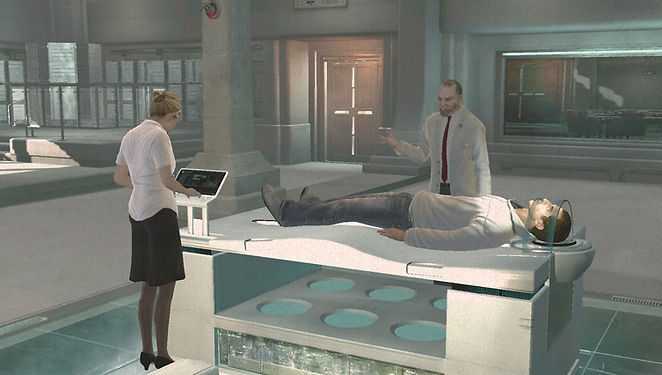Community

Articles
Lucy Stillman: Villain or Victim?
Save 10% on officially licensed Assassin's
Creed Origins merchandise with the code "TOWCB"
Top Stories

22/2/20 By Lauren Harris Edited by Ashlea Buckley
When Lucy Stillman was brutally murdered by a possessed-Desmond Miles, it shocked us all. This seemingly innocent 24 year old had done nothing wrong, nothing to deserve having her life stolen from her. At least, that’s what we thought – until the truth began to emerge. Piece by piece, we put together the jigsaw of Lucy’s life and discovered she was not the helpful, devoted Assassin that we all believed her to be. But was she truly the enemy, or was she just another pawn in Abstergo’s cross-shaped chess game? That is a question the series has never quite answered.
To understand Lucy fully, and to get a sense of what led her to do the things she did, we need to go back to the beginning. As far as we can tell, Lucy was born into the Brotherhood and she began her Assassin career at around age 14 when she was tasked with helping to track down the Pieces of Eden. Not yet an adult, not legally allowed to vote or drink or go to war, but somehow old enough in the eyes of the Brotherhood to be putting her life on the line for their cause. At the time, however, she accepted her role and she made friends with other Assassins such as Rebecca Crane. She was content. Three years later, at age 17, William Miles revealed he had a mission for Lucy – one that would take her far away from the safety of the Brotherhood, but which would also allow her to see the world outside of the narrow view of the Assassins. Lucy accepted the mission, whether willingly or otherwise, and said goodbye to the life she knew. To truly succeed in this mission, Lucy had to cut off almost all of her contact with the Brotherhood so that nobody would suspect her affiliation. For the first time in her life, Lucy was completely alone.
Lucy attended university, under the orders of William Miles, with the view to eventually gain employment as an Abstergo scientist. Lucy chose to study cognitive neuroscience, but the University told her she had no future if she continued to pursue pseudoscience. Having seemingly failed in her mission to get into Abstergo, Lucy began applying everywhere for work. The hand of fate was working in Lucy’s favour, however, as she caught the attention of Dr Warren Vidic, lead researcher on the Animus Project at Abstergo – and exactly the man William Miles wanted Lucy to meet.
Having found her way back into the mission she was set by the Assassins, Lucy accepted Vidic’s offer of employment and spent her time designing the hardware and operating system of the Animus and overseeing its construction. Lucy spent years at Abstergo – and it was during that time that her loyalties began to shift.
At some point, it was likely that Abstergo discovered Lucy’s past and her colleagues attempted to kill her. However, Vidic stepped in and saved her, saying she was too important for his project. Warren’s trust in Lucy caused her dedication to the Assassins to fade and she began working faithfully for the Templars. The Assassins were oblivious to this, and William Miles gave her a new mission: to have Clay Kaczmarek kidnapped and brought to Abstergo where she would give him unrestricted access to the Animus. She did this, though it was for Abstergo’s benefit rather than the Brotherhood’s. Clay discovered Lucy’s true allegiance, however, and realised he was not safe. Lucy told Clay she would uphold her promise to protect him, but she could not let him leave – for which she apologised. Clay, seeing no other way out, took his own life – but not before leaving messages for Desmond Miles, Abstergo’s next planned test subject. This death haunted Lucy and made her far more cautious when dealing with Desmond, afraid of repeating her previous mistakes.
Get 15% off with the code 'TOWCB'


About the Author

Lauren is a online article writer who loves the Assassin's Creed franchise.
As a member of the AC Partnership Program, she will be writing regular articles for the AC community, and her work can now be found in the Community Hub.
Lauren is especially interested in Assassin's Creed lore, and will be exploring this more in future articles.
Lauren Harris
Why did Lucy’s allegiance change? What led her to turn her back on the Brotherhood that has raised her? There were a number of things that could have contributed to her decision. First and foremost was Lucy’s dislike of William Miles. Throughout the series, characters have expressed the idea that Bill is difficult to form a relationship with. His own son severed all ties with him at 16 years old. Shaun questions whether Bill is “finally going soft” when he says he finds Lucy’s death “quite sad”. Gavin Banks is furious when Bill leaves the Brotherhood to him and disappears. It is clear that Lucy was not the only Assassin who had a negative view of William Miles. Lucy tells Clay that William does not care about them, and whilst it’s clear that is not true, it is also easy to see why Lucy would think this. William is a man who is very focused on his mission, even allowing his own son to go through Hell to further the Assassins’ cause. To Lucy, a woman who had been isolated since her teenage years, left alone in a place where her past had almost gotten her killed, it is unsurprising that she felt that Bill did not care about her – or Clay for that matter. Clay was being held prisoner by Abstergo – why would Bill not only allow that, but push Clay to do it?
Another factor in Lucy’s decision was her abandonment. The Assassins had sent her on a mission and then left her to fend for herself. Whilst everyone else was working in cells and had people to look out for them, Lucy Stillman was alone in a deadly organisation who were at risk of discovering her true identity at any minute – and they did. Even so, when Richard came to kill Lucy, Warren Vidic protected her. When was the last time William Miles had ever stuck his neck out for her?
Finally, and perhaps this is more speculative, Abstergo’s achievements. Above all else, Lucy was a scientist and her scientific skills were being wasted with the Assassins. Hunting down Pieces of Eden was not what made her happy. But constructing an Animus from scratch? Using her research into cognitive neuroscience to create new technology? That was what gave Lucy true fulfilment. At Abstergo, she was a pioneer. With the Assassins, she was simply another body that would eventually be added to the list of the dead. Sure enough, when Lucy did perish it was under the care of the Assassins, not the Templars.

Lucy certainly had her reasons for defecting from the Brotherhood, but were her motives truly so simple? Had she completely turned on her old friends, or was she just more aligned with Abstergo’s ideals? Lucy may be able to hide aspects of herself, but she would have to be a very talented actress to fake her friendship with Rebecca and Shaun. Why would she? After all, they weren’t the ones who left her alone at Abstergo. If anything, it seems as though Rebecca may have been the one person Lucy had minimal contact with in order to send her blueprints and information about the Animus. Shaun and Rebecca cared about Lucy. They made that clear. They were not the enemy and Lucy had no intention of hurting them. Then there were her subjects. Lucy knew she was betraying Clay, but she did not want to hurt him. She swore she would continue to protect him, to honour her promise to Bill (which is significant as she otherwise refuted everything the Assassins wanted of her). Indeed, when Clay took his own life, it haunted Lucy and made her more concerned for Desmond’s wellbeing. Lucy’s fears for Desmond were not a façade. In fact, Lucy emailed Warren whilst she and the team were living in the Sanctuary to tell him she was afraid that they were pushing Desmond too far. She warned Desmond repeatedly to take more breaks, to stop over exerting himself. She didn’t want another 16 on her hands. When Desmond tells Lucy she was a prisoner at Abstergo too, she doesn’t deny it. Was she simply keeping up appearances or, on some level, did she believe Desmond was right? Did Lucy have a choice in the matter or did she only stay at Abstergo because she needed Warren’s protection? After all, who knows what the Templar would have done if she had attempted to leave...
Lucy cared for her friends, she looked out for them, and they never had the chance to hear her side of the story. We know she was a double agent. She was emailing Warren through a fake name and sneaking away to make phone calls to him – but all the while she was in turmoil over the trauma she was causing Desmond, and blood she still had on her hands from Clay. She was doubting herself and doubting her mission. Who knows what decision she would’ve made in the end? She agreed to Warren’s plan when she was still alone and her only friends were her colleagues at Abstergo. Back with the Assassins and in the midst of people who truly cared about her, maybe she would’ve changed her mind. With Lucy dead, the only word we have about her intentions is that of Juno, undoubtedly the most untrustworthy person in the entire series. Maybe Lucy wasn’t going to hand over the Apple in the end. Maybe she was playing everyone.
Or maybe she was going to do it. Maybe it was her own way of getting back at humanity. She was 24 years old and felt almost half her life had been lost to her mission. She never had the chance to be a regular teenager, or to enjoy her 20s. She didn’t get to go to high school or prom or have an 18th birthday party with her friends or go on dates in fancy restaurants. Her entire life was either the Brotherhood or the Templars. She had no way out. Who could blame her if she decided the best plan was to nuke the planet and start again? After all, what had this world ever done for her?
We’ll never know exactly what Lucy’s intentions were, and we’ll never truly know if she was a Templar by choice, or if she was just another victim of their machinations. If this series has taught us anything, it’s that nothing is true. Nothing is ever black and white. No one is truly good or evil. The world is far too complex to fit into such binary ideas. Maybe it isn’t about Lucy being a villain or a victim. In reality, she was both. A hero and a villain. A friend and a foe. Someone who wanted to make the world better, but felt she couldn’t do that without the power of a dangerous conglomerate behind her. Ultimately, whatever decisions Lucy made in life, she did not deserve to die for them. As Desmond said, Lucy thought she was doing the right thing. And when it comes down to it, isn’t that what really matters?













